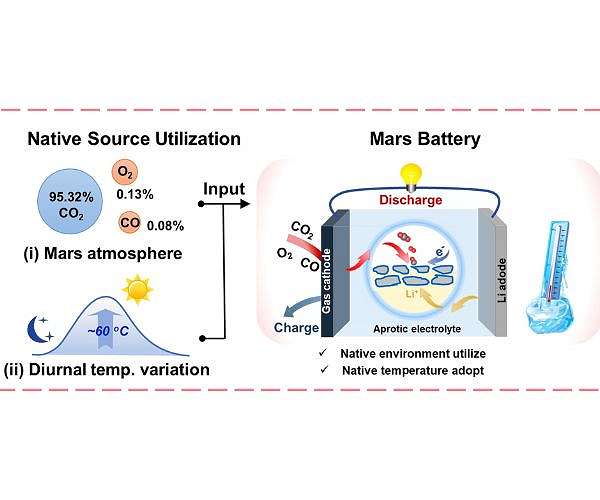A high energy density Mars battery designed for long-duration missions
The extreme environmental conditions on Mars, with an atmosphere of 95.32% carbon dioxide and significant temperature fluctuations, pose major challenges for energy storage systems on the planet. To overcome these hurdles, Prof. Peng Tan and Dr. Xu Xiao from the University of Science and Technology of China have developed a new type of Mars battery, which uses the Martian atmosphere as a fuel source during discharge.
This innovative battery system minimizes weight, making it ideal for space missions. Once discharged, the battery can be recharged using solar energy collected from the surface of Mars, allowing for repeated use. The researchers also simulated Martian surface conditions, including wide temperature ranges, to create a system capable of consistent power delivery.
The Mars battery operates efficiently even at low temperatures, such as 0 C, where it reaches an energy density of up to 373.9 Wh kg-1 and provides a charge/discharge cycle time of 1,375 hours, which equates to approximately two months of continuous operation on Mars . Its functionality depends on the formation and breakdown of lithium carbonate, with trace gases such as oxygen and carbon monoxide in the Martian atmosphere acting as catalysts to enhance the conversion of carbon dioxide.
The team improved the reaction efficiency by designing integrated electrodes and a folded cell structure, maximizing the reaction area with the Martian atmosphere. By increasing the cell size to 4 cm, they further improved the battery’s energy density to 765 Wh kg-1 and 630 Wh l-1 in pocket size.
According to the researchers, this development represents an essential proof-of-concept for the application of Mars batteries in the planet’s environment. They plan to continue researching solid-state Mars batteries, addressing challenges such as the volatility of electrolytes under low pressure, and improving thermal and pressure management systems. Their work lays the foundation for complementary multi-energy systems, essential for future space exploration missions.
Research report:A Mars battery with a high energy density and a long lifespan


